 Libri di Dorrit Cohn su Unilibro.it
)
Libri di Dorrit Cohn su Unilibro.it
)
|
|
2025 |
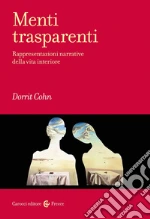 Title :
Menti trasparenti. Rappresentazioni narrative della vita interiore
Title :
Menti trasparenti. Rappresentazioni narrative della vita interioreAuthor: Cohn Dorrit Publisher: Carocci Caposaldo della narratologia novecentesca finora ingiustamente misconosciuto in Italia e qui tradotto integralmente per la prima volta, il volume ci offre un'indagine rigorosa e appassionante delle tecniche narrative utilizzate dai più grandi romanzieri del XIX e del XX secolo per dare voce alla vita interiore dei loro personaggi. La psiconarrazione, il monologo citato, il monologo narrato, l'autonarrazione, il monologo autonomo sono illustrati attraverso esempi tratti da scrittori come Jane Austen, Stendhal, Fëdor Dostoevskij, Thomas Mann, James Joyce, Marcel Proust e molti altri. A quasi cinquant'anni dalla sua prima pubblicazione, il saggio di Cohn resta un'opera viva e attuale, capace di fornire ancora risposte stimolanti e tutt'altro che scontate a chi si interroga sulla necessità dell'arte narrativa e a chi cerca di capire che cos'è la finzione e quali sono i suoi possibili usi. € 34,00
Scontato: € 32,30
|
|
|
2022 |
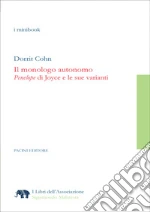 Title :
Il monologo autonomo. «Penelope» di Joyce e le sue varianti
Title :
Il monologo autonomo. «Penelope» di Joyce e le sue variantiAuthor: Cohn Dorrit Publisher: Pacini Editore The Autonomous Monologue è l'ultimo capitolo di Transparent Minds (1978) di Dorrit Cohn: un caposaldo della narratologia, mai tradotto in italiano. Attraverso la forza dei grandi disegni storici e la lucida precisione delle singole analisi, l'autrice indaga le forme e i modi in cui la vita psichica viene rappresentata nel romanzo, fino a fare del monologo di Molly Bloom l'apice del realismo psicologico. € 9,50
Scontato: € 9,03
|
|
|
1910 |
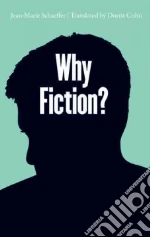 Title :
Why Fiction?
Title :
Why Fiction?Author: Schaeffer Jean-Marie, Cohn Dorrit (TRN) Publisher: Univ of Nebraska Pr In Why Fiction?—one of the most important works of narrative theory to come out of France in recent years—Jean-Marie Schaeffer understands fiction not as a literary genre but, in contrast to all other literary theorists, as a genre of life. The result is arguably the first systematic refutation of Plato's polemic against fiction and a persuasive argument for regarding fiction as having a cognitive function. For Schaeffer fiction includes not only narrative fiction but also children's games, videos, film, drama, certain kinds of painting, opera—in short, all the intentional structures arising from shared imaginative reality. Because video games and cyber-technologies are the new sites of entry for many children into such an imagined universe, studying these cyber-fictions has become integral to our understanding of fiction. Through these avenues, Schaeffer also explores the foundations of mimeticism in order to explain the important effect fiction has on human beings. His work thus establishes fiction as a universal aspect of human culture and offers a profound and resounding answer to the question: Why fiction? € 53,60
|
|
|
2000 |
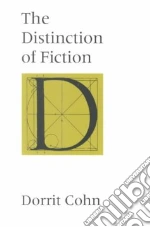 Title :
The Distinction of Fiction
Title :
The Distinction of FictionAuthor: Cohn Dorrit Publisher: Johns Hopkins Univ Pr Winner of the Modern Language Association's Aldo and Jeanne Scaglione Prize for Comparative Literary Studies The border between fact and fiction has been trespassed so often it seems to be a highway. Works of history that include fictional techniques are usually held in contempt, but works of fiction that include history are among the greatest of classics. Fiction claims to be able to convey its own unique kinds of truth. But unless a reader knows in advance whether a narrative is fictional or not, judgment can be frustrated and confused. In The Distinction of Fiction, Dorrit Cohn argues that fiction does present specific clues to its fictionality, and its own justifications. Indeed, except in cases of deliberate deception, fiction achieves its purposes best by exercising generic conventions that inform the reader that it is fiction. Cohn tests her conclusions against major narrative works, including Proust's A la Recherche du temps perdu, Mann's Death in Venice, Tolstoy's War and Peace, and Freud's case studies. She contests widespread poststructuralist views that all narratives are fictional. On the contrary, she separates fiction and nonfiction as necessarily distinct, even when bound together. An expansion of Cohn's Christian Gauss lectures at Princeton and the product of many years of labor and thought, The Distinction of Fiction builds on narratological and phenomenological theories to show that boundaries between fiction and history can be firmly and systematically explored. € 24,30
|
|
|
Data Pubblicazione 'Non disponibile' |
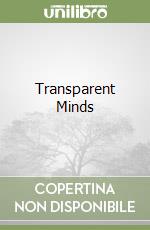 Title :
Transparent Minds
Title :
Transparent MindsAuthor: Dorrit Cohn Publisher: BERTRAMS PRINT ON DEMAND This book investigates the entire spectrum of techniques for portraying the mental lives of fictional characters in both the stream-of-consciousness novel and other fiction. Each chapter deals with one main technique, illustrated from a wide range of nineteenth- and twentieth-century fiction by writers including Stendhal, Dostoevsky, James, Mann, Kafka, Joyce, Proust, Woolf, and Sarraute. € 53,90
|